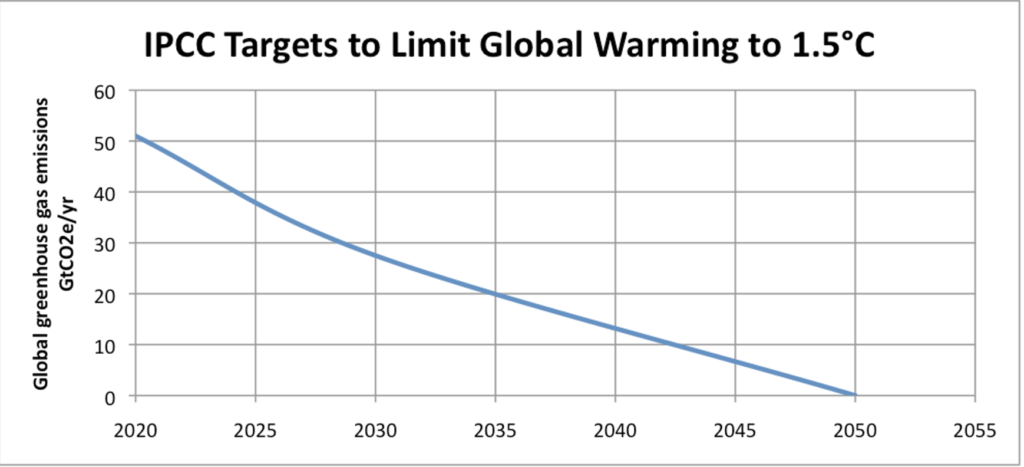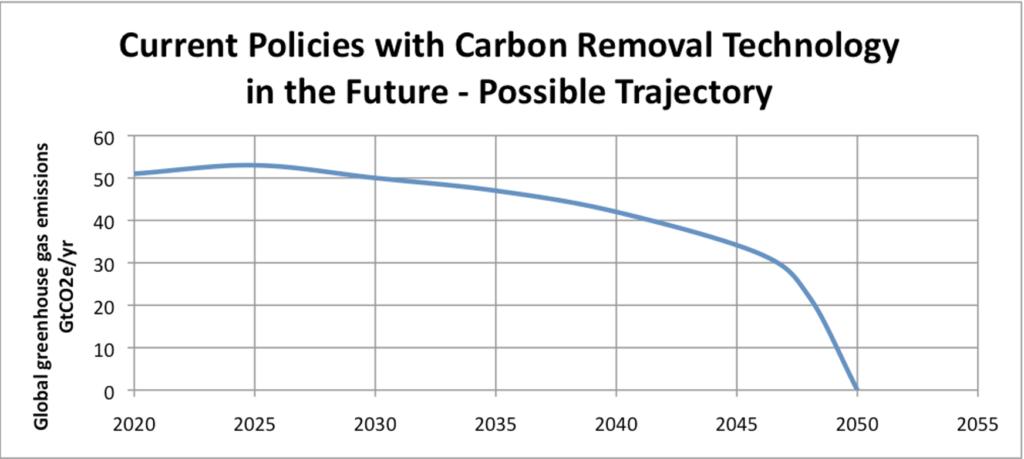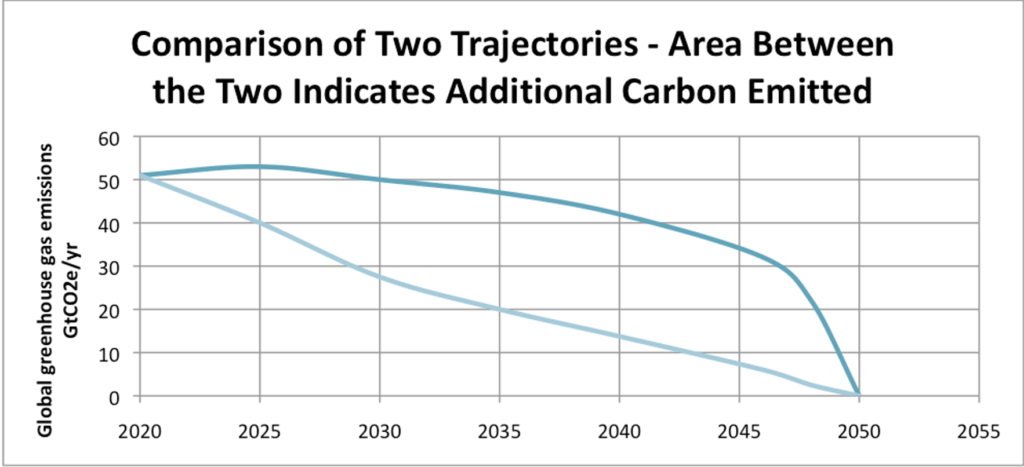Opinion: Love, Justice And Climate Change. Problems with “Net-Zero by 2050”

Sunset at Brighton Beach, Brooklyn, NY. Photo: Russ Vernon-Jones

Many nations, corporations, municipalities, and other entities are setting goals to be “net-zero by 2050,” that is, to have zero net greenhouse gas emissions by the year 2050. While this may seem like an admirable goal, there are significant and dangerous problems with this whole approach.
In 2018 the Intergovernmental Panel on Climate Change (IPCC) issued a report in which it emphasized that in order for humanity to keep global warming below 1.5°C it was necessary for the world to reduce greenhouse gas emissions by 45% by 2030 and to “net-zero” by 2050. The “net-zero” in this statement was an acknowledgement that no matter how vigorously we cut emissions, there will likely still be small amounts of emissions (mostly in some industrial processes) that we can’t totally eliminate and these will have to be balanced by equivalent increases in carbon sequestration. This IPCC statement was accurate, but has been distorted and misused in multiple ways.
Problem #1 – Ignoring the 2030 goal
First the 2030 goal and the 2050 goal in the IPCC report are paired with each other and must be implemented together. Many of the current adoptions of the 2050 goal are ignoring, or failing to even come close, to the 2030 target. “Net-zero by 2050” is a recipe for disaster if we don’t first reduce emissions by 45% by 2030.
Here’s why.
The real issue is that there is a finite amount of additional carbon (or “carbon equivalent”) emissions that humanity can put into the atmosphere without driving global warming beyond the critical 1.5°C limit. (That’s a finite amount for all time, not an amount per year.) This is sometimes called our carbon budget. In 2018 the IPCC reported that the world’s total remaining carbon budget was approximately 580 GtCO2. The IPCC indicated that the most realistic way to not exceed that amount of total emissions was to reduce emissions steadily, achieving a 45% reduction by 2030; and then get to net zero emissions by 2050. This graph provides a rough approximation of what the IPCC called for.

Instead, most nations and corporations, including those that have claimed to be aiming for net-zero by 2050, are continuing unacceptable emissions now, and delaying major reductions for sometime in the future (hoping that new technology will enable carbon to be removed from the atmosphere as we approach 2050). If they get to net-zero by 2050 it will likely be on a trajectory that looks somewhat like this.

Both paths get to net-zero by 2050, but total emissions are very different under the two scenarios. The one with a 45% reduction by 2030 adds only the quantity of greenhouse gasses to the atmosphere equal to the area under the line on the first graph–exhausting, but not exceeding our carbon budget, keeping global temperature rise close to the 1.5°C target.

The “Current Policies…” trajectory that many nations and businesses seem to be following in practice, adds far more carbon to the atmosphere–the area under the first line plus the area between the two lines– and exceeds the world’s total carbon budget long before we get to 2050. The result will be global warming well in excess of 1.5°C–possibly a 2.4°C global temperature rise–resulting in truly disastrous global climate change.
“Net-zero by 2050” only makes sense if it is combined with a 45% reduction by 2030.
Problem #2 – Equity
The IPCC 2018 report called for global emissions to meet the 2030 and 2050 goals, but did not suggest that the way to get there was for each nation to view those global goals as national goals. The United States, a rich developed country, used up and exceeded its fair share of the global carbon budget many years ago. For the U.S. to continue to use even more of the remaining global carbon budget is unfair.
Poor developing nations have neither used their share, nor gotten rich by burning fossil fuels. The small remaining carbon budget should be available to them as needed to meet the needs of their people while moving as rapidly as possible toward sustainable economies.
The U.S. should be ending all use of fossil fuels as rapidly as is possible–long before 2050. A poor, less-developed country such as India, currently very dependent upon fossil fuels for power, will need more time to transition to non-polluting energy sources, than a country with all the resources of the U.S.
Leading up to the COP26 conference, 24 developing nations (including India, Indonesia, Egypt, China, Vietnam) issued a statement calling the idea of “net-zero by 2050” targets for developed countries “anti-equity and against climate justice“. They noted the importance of “ensuring sustainable development and poverty eradication in developing countries” while the world solves the climate crisis. They called on rich nations to address their historical responsibility for causing climate change by decarbonizing their economies “in this decade”– in other words to aim for net zero by 2030.
Problem #3 – Issues With “Net”
As three respected climate scientists wrote in April of this year, “the idea of net zero has licensed a recklessly cavalier ‘burn now, pay later’ approach which has seen carbon emissions continue to soar” and contributed to increasing deforestation. This destructive approach is based on the idea that we can keep burning fossil fuels because sometime in the future we will develop ways to remove carbon dioxide from the atmosphere. Some polluting corporations are claiming that sufficient removal will achieve net-zero without requiring rapid elimination of the use of fossil fuels. The problem with this is that the technology for removal on the scale required does not exist and many doubt that it ever will.
As these scientists go on to say, “humanity has gambled its civilization on no more than promises of future solutions.” Planting trees, for instance, does help sequester carbon, but trees take time (which we don’t have) to grow and cannot match the size of the problem we are creating with continuing to add CO2 to the atmosphere. What we need are absolute reductions in emissions–heading quickly toward zero emissions–not wishful thinking about offsets and non-existent technology.
Problem #4 – “Net-zero” Being Used For Greenwashing
Greenwashing is the use of deceptive public relations to convince the public that products, activities, and operations of a corporation or government are “green” or good for the climate, when they are actually harming the environment. Many companies and governments are finding it easy to announce that they are committed to becoming “net-zero”, while they continue to follow policies that add fossil-fuel emissions to the atmosphere and make the problem worse. Much of this is intentional deception based on relentless pursuit of profits at any cost.
Eversource, a New England gas and electric utility (and my electricity provider), has touted its commitment to making its operations net-zero by 2030. Sounds good, doesn’t it? Until you learn that by “operations” they only mean their own buildings and vehicles, not their main business–which is selling fossil gas and electricity generated primarily from fossil fuels. They are seeking to expand, not contract, that business, including “plans to renew long-term gas contracts and spend billions upgrading gas infrastructure.” It was also recently revealed that they are part of a coalition working to thwart building electrification and oppose climate activists’ initiatives. Here’s a clever, short parody video that climate activists made to expose Eversource’s greenwashing.
In conclusion, as the scientists mentioned above write, the “concept of net-zero is a dangerous trap.” Our goal must be to eliminate all greenhouse gas emissions and increase natural forms of carbon sequestration at the same time.
Russ Vernon-Jones was principal of Fort River School 1990-2008 and is currently a member of the Amherst Community Safety Working Group and of the Steering Committee of Climate Action Now-Western Massachusetts. He blogs regularly on climate justice at www.russvernonjones.org.
